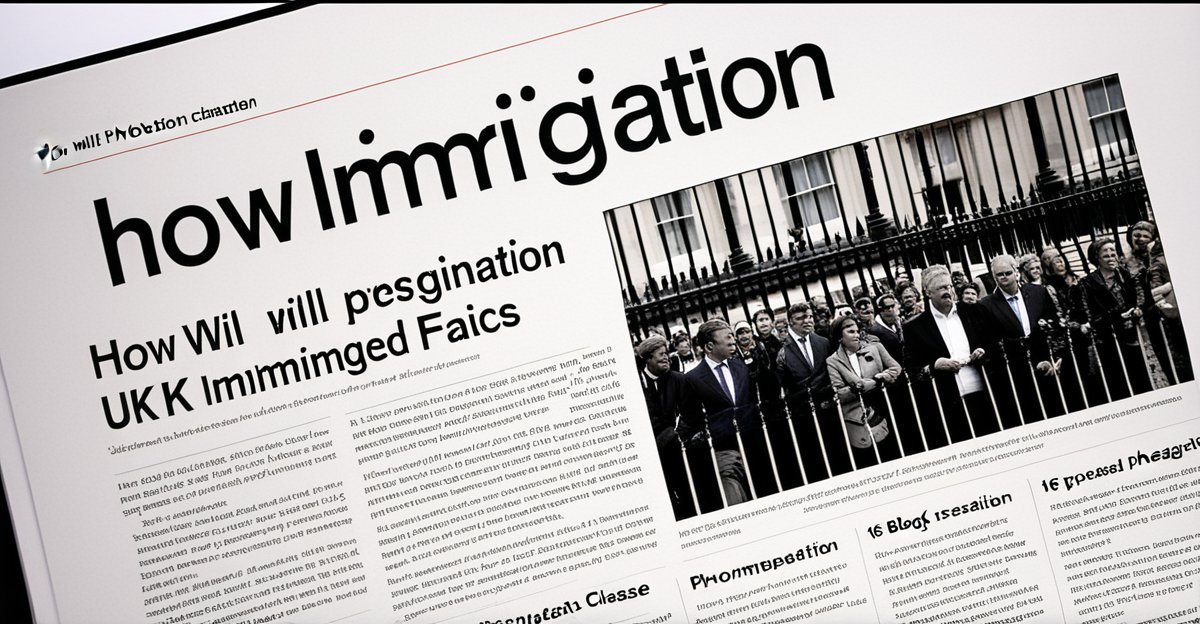Immediate Changes Expected from Proposed Legislation
The proposed UK immigration legislation introduces several key elements aimed at reshaping the current framework. Most notably, it tightens controls on entry criteria and enhances enforcement mechanisms. These changes mark a clear departure from existing UK immigration policies, which have allowed broader access through various visa categories and more flexible asylum provisions.
One major shift involves stricter eligibility requirements, reducing pathways previously open for low-skilled workers and students. The new law demands more rigorous documentation and compliance checks at border entry points, reflecting a focus on national security and economic priorities.
In parallel : How is the UK addressing challenges in its healthcare system?
The legislative impact extends to asylum procedures, with accelerated timelines for processing and potentially fewer protections for certain applicants. This contrasts with the current system that offers more comprehensive appeal opportunities.
Implementation is expected within the next 12 months, following parliamentary approval. The government plans phased rollouts, allowing employers, applicants, and officials time to adjust to the new immigration rules.
Additional reading : How Might Recent Events Affect the Future of UK Governance?
Overall, these prompt alterations signal a decisive move in UK immigration policy, prioritising stricter control and streamlined enforcement over expansive access.
Anticipated Transformations in Visa Types and Asylum Procedures
The proposed UK visa reforms will notably narrow eligibility across several visa categories. Low-skilled worker visas, previously more accessible, will face tightened criteria, reducing entry for many who do not meet stricter skill or salary thresholds. Student visa pathways will also require enhanced evidence of course enrolment and financial stability, streamlining the immigration application process.
Regarding asylum, the asylum policy changes aim to accelerate case processing by imposing stricter deadlines and limiting extended appeals available under current law. These adjustments intend to reduce backlog but may result in fewer protections for some applicants, particularly those in vulnerable situations.
Processing times under the new scheme are expected to be shorter, but with an increased focus on thorough documentation and eligibility verification. Approval rates could fluctuate as criteria sharpen, prioritising applicants with clear compliance and economic contribution.
Overall, the legislative impact will introduce a more rigorous framework for both work-related visas and asylum applications, demanding higher compliance and offering fewer discretionary allowances compared to existing UK immigration policies. This signals a shift toward efficiency and control in managing migration flows.
Impact on Workers, Employers, and Skilled Migration
The legislative impact on skilled worker migration is significant. The proposed rules recalibrate eligibility by raising skill and salary thresholds, limiting access for some foreign workers. This change directly affects many applicants who previously qualified under more flexible standards. Employers must now navigate stricter employer sponsorship requirements, including detailed compliance checks and increased reporting duties. These measures aim to ensure that sponsored workers fill genuine skill shortages and meet national economic priorities.
For UK businesses, these changes could tighten the talent pipeline, heightening competition for highly skilled international recruits. However, the reforms also seek to protect the domestic labour market from oversaturation in certain sectors by prioritising skill levels. Existing foreign workers face uncertainty as visa renewals and extensions undergo tougher scrutiny.
The new immigration legislation reflects a broader strategy to balance economic growth with workforce stability, encouraging employers to invest in domestic training alongside selective skilled migration. This recalibration underlines the government’s intent to align migration flows closely with labour market needs, impacting recruitment strategies and long-term workforce planning in the UK.
Legal Insights and Expert Opinions
Legal experts widely analyse the legislative impact of the proposed immigration reforms with a focus on potential challenges and ambiguities. Many immigration lawyers highlight concerns regarding the tightened eligibility criteria, warning that the new immigration rules may increase legal disputes, especially over borderline cases where applicants might no longer qualify under stricter definitions.
Experts critique the rapid timelines for processing, fearing that accelerated procedures could compromise thorough assessments, potentially affecting vulnerable applicants negatively. Legal analysis often points to the risk of reduced appeal rights breeding higher litigation rates, as some individuals may seek judicial review to contest decisions made under the new enforcement regime.
Policy commentators also debate the broader societal impacts, suggesting that while the government aims to improve efficiency, insufficient safeguards could undermine long-term fairness. They underscore the importance of maintaining transparency and access to justice within the framework of the UK immigration policies.
Overall, expert commentary balances recognition of the intention behind reforms with caution over execution risks. The legislative impact will likely stimulate ongoing legal scrutiny and calls for adjustments to ensure equitable outcomes alongside effective enforcement.
Frequently Asked Questions on Proposed Immigration Legislation
The UK immigration FAQ addresses common concerns, offering clear answers on how the new immigration rules affect applicants. One frequent question asks: How will the legislative impact alter visa eligibility? The reply is that criteria will tighten, especially for low-skilled and student categories, demanding stricter compliance and documentation.
Another typical inquiry is: What changes will occur in asylum application procedures? Answering with precision, the asylum policy changes shorten processing times and limit appeals, aiming to expedite decisions but potentially reducing protections. This reflects the legislative impact of prioritising efficiency over extended review options.
People also ask: When will the new laws take effect? The government plans phased implementation within 12 months post-approval, giving stakeholders time to adjust.
FAQs further clarify employer responsibilities, enforcement mechanisms, and appeal processes under the revised framework. These answers help applicants, employers, and legal advisors understand the practical effects of UK immigration policies and support informed decision-making throughout the transition to the updated system.

